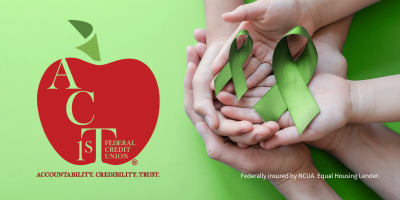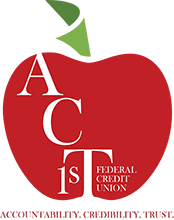
We're growing and we're taking you with us.
MOVING FORWARD TOGETHER.


May is not only Mental Health Awareness Month, but also a time to reflect on how our financial well-being impacts our mental health, as the stress and anxiety caused by money can have a significant impact on our overall well-being.
What is the impact of financial difficulties on mental well-being?
Financial difficulties can have a significant impact on our mental well-being in various ways.
∙ Increased levels of stress and anxiety. The pressure of financial struggles can cause individuals to experience high levels of stress and anxiety, which in turn can have detrimental effects on their physical health. This can manifest in symptoms such as insomnia, headaches, and fluctuations in weight.
∙ Depression. The burden of financial hardship can lead to feelings of hopelessness and despair, resulting in a loss of interest in previously enjoyed activities and a decline in overall functioning in daily life.
∙ Strained relationships across various spheres. Money problems can create tension in various types of relationships, such as romantic partners, parents and children, siblings, friends, and more.
What is the influence of financial stability on mental well-being?
Let’s delve into the ways in which financial stability can affect an individual’s mental well-being:
∙ Peace of mind. Having a stable financial situation can instill a feeling of security and tranquility, alleviating personal stress and anxiety.
∙ Enhanced opportunities. Leading a financially responsible life opens up doors for individuals to pursue their interests and passions.
∙ Better relationships: Financial stability can also contribute to improved relationships by reducing the stress and tension that often accompany financial hardships.
Debt and Mental Health
Studies indicate that individuals who find themselves in a state of indebtedness are at a higher risk of encountering psychological issues such as anxiety, depression, and even contemplating suicide. If you are currently facing challenges in liberating yourself from debt, it may be worth considering the option of consolidating your debts through a personal or unsecured loan. By doing so, you will only have to make a single monthly payment, which could potentially have a lower interest rate, thereby alleviating some of the financial burden.
Enhancing Mental Well-being through Effective Financial Management
Here are ways you can improve your financial and mental health:
∙ Establish a budget and stick to it.
∙ Seek assistance from a financial counselor – ACT 1st FCU is partnered with the trusted national nonprofit GreenPath Financial Wellness giving our members access to free, one-on-one financial counseling delivered by caring, certified experts.
∙ Engage in stress-relieving activities such as meditation, yoga, or physical exercise.
∙ Set achievable financial goals and make progress towards accomplishing them.
∙ Focus on personal achievements unrelated to your financial worth.
By effectively managing your financial situation and reaching out for assistance when necessary, you have the ability to enhance your mental health and overall well-being. Does this blog entry resonate with you? If you are seeking a conversation about debt, financial stress, and ways to alleviate the burdens in your life, we recommend reaching out to our partners at GreenPath Financial Wellness.
Unlocking the Benefits of a Home Equity Line of Credit (HELOC)
Have you ever wondered, “What is a HELOC?” You’re not alone!
A Home Equity Line of Credit, or HELOC for short, can be a fantastic financial tool, and we’re here to break it down for you!
What is a HELOC?
A HELOC, which stands for Home Equity Line of Credit, is a flexible loan that allows you to tap into the equity in your home. But, what’s equity? It’s the difference between the current value of your home and the outstanding balance on your mortgage
How Does It Work?
Here’s the scoop: If your home is worth more than what you owe on your mortgage, you have built up equity. With a HELOC, you can leverage this equity to secure a line of credit. Unlike traditional loans that provide a lump sum at the start, a HELOC lets you access funds as you need them. It’s like having a financial safety net right at your fingertips.
Why Consider a HELOC?
HELOCs are incredibly versatile and can be used for various purposes:
◦ Home Improvements: Boost your property’s value with renovations.
◦ Debt Consolidation: Say goodbye to high-interest debts.
◦ Education: Invest in your future or your children’s education.
◦ Emergency Funds: Have a financial cushion when life throws surprises.
◦ Flexible Access: Withdraw funds on your terms.
Total Control Over What You Owe
With a HELOC, you’re in the driver’s seat. Once approved, you choose when and how much to withdraw. This level of control means you determine your repayment schedule. Even better, you only pay interest on the amount you’ve borrowed.
Is a HELOC Right for You?
Still not sure if a HELOC is the right choice for your financial goals? No worries! Our team at ACT 1st FCU is here to guide you. Let’s chat about your specific needs and see if a HELOC is the perfect fit for you!
Ready to explore your options?
A HELOC lets you borrow when you need it against the equity in your home.
HELOC: Home Equity Line of Credit. A HELOC is a loan that lets you use a portion of the equity in your home and borrow against it when you need it.
Equity: Equity is the value of your home minus what you owe to your lender. Is your home worth more than the amount owed on the mortgage? If so, you have equity in your home and may be eligible for a line of credit secured by that equity.
Unlike other loan options that payout a lump sum upon closing, a HELOC lets you draw money as needed over time!
HELOCs are often used for home improvement projects, especially when they increase the overall value of your home. But they can also be used for other needs, like consolidating high-interest debt, education costs, having flexible access to funds and more. Once approved for a line of credit, you control when and how much you withdraw, which means you control how much you have to repay. You also only pay interest on the amount you withdraw.
Is a HELOC the right loan for you?
Talk to our team at ACT 1st Federal Credit Union and help you see if this is a good fit.
We are thrilled to announce the launch of our brand new Loan Payment Skip Program, exclusively for our valued members!
This exciting program allows you to skip a payment on your loan, providing you with some much-needed financial flexibility. Whether you’re facing unexpected expenses or simply want to free up some extra cash for a special occasion, our skip payment program is here to help. With just a few simple steps, you can take advantage of this incredible opportunity and enjoy some breathing room in your budget.
Not only does our Loan Payment Skip Program offer convenience and flexibility, but it also provides peace of mind. We understand that life can throw unexpected curveballs, and sometimes finances can become tight. That’s why we’ve designed this program with our members’ best interests in mind. By skipping a payment, you can alleviate some financial stress and focus on what matters most – whether that’s taking care of your family, paying off some debt, or simply enjoying life to the fullest.
So, why wait? Take advantage of our Loan Payment Skip Program today and experience the freedom it brings! Our dedicated team is here to support you every step of the way, ensuring that you have all the information and guidance you need! Your financial well-being is our top priority, and we’re excited to provide you with this valuable resource.
Please look over our Loan Payment Skip Program webpage to read how to quality, terms & restrictions
The 5 Factors That Affect Your Credit Score (And Simple Ways to Boost Them!)
Recently, we’ve learned that some members have received fraudulent calls that appear to be from the credit union that can put your account and funds at risk! This scam is known as Caller ID spoofing.
What is Caller ID spoofing? Caller ID spoofing is the process of changing the Caller ID to any number other than the actual calling number. The caller intentionally disguises the number they are calling from.
How can you stop spoofing calls? While there’s nothing you can do to stop them, there are three very important steps you can take to prevent being a victim:
1. If in doubt, don’t answer it. You can call the number directly later to see if it was a real person or company.
2. Be diligent! Even if your caller ID shows a familiar number (perhaps a local area code), assume it is not a legitimate call. Be very cautious about giving any information to an unsolicited caller. If you are unsure, hang up, and call the person or business directly.
3. Block the calls. Check with your phone carrier to see if they have a service or app that helps to identify and filter out spam calls. For instance, both AT&T and Verizon have apps that provide spam screening and/or fraud warnings.
Here’s an example of what has been happening: A member received a call that was spoofed with ACT 1st FCU’s actual phone number stating that their debit card was in jeopardy of fraud (the spam caller created urgency.) The spammer stated that he would cancel the member’s card immediately, and expedite a new card the next day but wanted to verify the card number, account number, PIN number as well as other personal information. PLEASE NOTE: The Credit Union will NEVER initiate a call to ask for your account number, card number and PIN number – we already have all that information.
If you receive a call similar to this, and you’re not sure it’s from us, hang up and call us directly regarding your account. And remember, you can manage your account directly with our Mobile App. It will send instant alerts for any transaction and allows you to remotely turn your debit card on and off for security.
The Procrastinator’s Guide to Holiday Travel Savings

Holiday travel season is near, and peak prices already tell that story: nearly 75% of Hopper customers say that as they book travel this year, they plan to spend the same or more than what they shelled out last year. If this sounds uncomfortably familiar, don’t panic! Even if you’ve waited until the last minute, there are ways to trim down on steep travel costs.
Comparison Shop
When booking at the last–minute, it’s tempting to grab the first available flight or hotel that fits your schedule – resist this urge. You can often find better deals by comparing discount sites like Kayak or Booking.com. And don’t forget to check the prices for one-way tickets, which can be cheaper than round-trip fare.
Be Flexible
The more flexible you are with your travel schedule, the better your chances of snagging a deal. Consider shifting your departure or return date by a day or two; this small adjustment can save you hundreds. Similarly, early morning or red-eye flights are typically less expensive than those in the afternoon.
Explore Alternate Airports
When searching for flights, don’t limit yourself to the major airport closest to your destination. Check out regional airports nearby, both at your departure and arrival points. Alternative airports could offer cheaper fares and less congestion. If you’re traveling to New York for instance, consider Newark (EWR) or LaGuardia (LGA) in addition to JFK.
Bundle Away
If you need a hotel or rental car in addition to your flight, some booking platforms offer bundle deals that allow you to save by booking everything together. Sites like Expedia or Priceline will often discount the package price for flights, hotels, and rental cars when you book them together. This also simplifies your planning process by managing everything in one place.
Cash In Travel Points
Have you been accumulating frequent flyer miles or credit card rewards? Now is the time to cash in. Many airlines and rewards programs allow you to redeem points for flights or hotels, potentially covering a hefty portion of your expenses – or even your entire trip. If you don’t have enough points for a full redemption, using them can still help if you’re trying to stick to a budget.
Skip Bag Fees
If possible, aim to pack everything in a carry-on to avoid checked baggage fees. Many airlines charge up to $50 for the first checked bag each way, which adds up quickly for a family. Traveling light saves you money and time at the airport – no waiting at baggage claim, and less hassle navigating through the airport.
Don’t Skip Insurance
While it might seem like an extra cost, investing in travel insurance can save you from financial fallout later. Look for policies that cover cancellations, delays, and medical emergencies. Some credit cards also offer built-in travel insurance if you use them to book your trip, so check to see if you’re already covered.
Hit the Road
Consider other transportation methods, like trains or buses. While they might take longer, services like Amtrak, Greyhound, or Megabus may offer competitive rates for last-minute trips. Plus, traveling by train or bus can be a scenic way to enjoy the journey without the hassle of long airport lines.
Bonus Tips
Carpool with Family or Friends: If your destination is within driving distance, catch a ride (and split the gas.)
Stay with Family or Friends: If possible, stay with loved ones instead of booking a hotel (many of which tack on parking and resort fees.)
If holiday costs feel overwhelming, let our trusted partners at GreenPath Financial Wellness be a resource for personalized guidance on budgeting for travel expenses (so you can enjoy the holidays without the weight of financial stress.)
Recommended for You:
Prepare for Holiday Spending Now
This recorded webinar will walk you through the steps to financially prepare for the holidays and explore ways you can leverage discounts and rewards.
From Passwords to Privacy: Master Your Digital Defense
In today’s modern society, safeguarding your digital information has become increasingly crucial. With the implementation of EMV chips on the majority of credit and debit cards, instances of fraud in physical settings have significantly decreased. However, cybercriminals have shifted their focus to online platforms, making it vital for you to be prepared and knowledgeable.
We are committed to ensuring your online safety at all times. To assist you in this endeavor, we have categorized the information by medium and consulted our team of internal security specialists.
Here is what you should be aware of:
Passwords: Secure Your Login
Consider the number of accounts you have that require passwords, such as Online Banking, Netflix, Facebook, and more. It’s likely that you have over 20 accounts, maybe even more than 40! How can you be expected to remember that many different high-strength passwords?
According to cybersecurity experts, utilizing a password manager is an effective way to safeguard your accounts. A password manager is a tool that generates, encrypts, and securely stores unique passwords for each of your accounts. Instead of using easily guessable passwords like “Password” or “123456,” a password manager will create strong passwords on your behalf and provide them whenever you need them.
You have the option to choose between locally installed and cloud-based password managers, so we recommend researching and finding the best tool that suits your needs.
5 Most Common Passwords:
1. 123456
2. 123456789
3. qwerty
4. Password
5. 111111
Don’t use these passwords.
What You Should Do
○ Determine how many password-protected accounts you really have.
○ Consider migrating your passwords into a password manager.
○ Enable multifactor authentication wherever possible (the extra step keeps you safer).
○ If you no longer use an account, delete it or have it deactivated.
○ Ensure you aren’t using the same password for multiple accounts.
Email: Secure Your Inbox
Your email address plays a crucial role in your online activities. It is utilized for various purposes, including signing up for Online Banking and online shopping platforms. Over the past decade, numerous major companies have experienced email breaches, emphasizing the importance of safeguarding your own account.
What You Should Do
○ Avoid opening emails from senders you don’t know or recognize. Delete them immediately.
○ Don’t click on any links or open any attachments in suspicious emails.
○ Set up multifactor authentication for an extra layer of login security.
○ Make sure your password is strong and un-guessable.
Security Tip From the ACT 1st FCU Fraud Department
Take a sentence and abbreviate it as your password.
Example: Wow!tb@MCDwaGr8 = Wow! The burger at McDonald’s was great.
Social Media: Secure Your Profiles
Social media is a remarkable advancement, allowing billions of individuals to share and communicate with others worldwide. Although it offers numerous advantages, it also exposes people to various scams.
Here are some of the most common ones to look out for:
○ Avoid opening emails from senders you don’t know or recognize. Delete them immediately.
○ Don’t click on any links or open any attachments in suspicious emails.
○ Set up multifactor authentication for an extra layer of login security.
○ Make sure your password is strong and un-guessable.
Catfishing
This is when a scammer creates a mock social media profile to bait you into a fake online relationship. The scammer then builds trust and leverages the relationship to get money or other valuable benefits from you.
Profile Hijacking
There are two forms of profile hijacking to look out for. In one scenario, a scammer will hack into your profile and change the password, essentially locking you out. (That’s why you need a strong password!) The other scenario involves the scammer pretending to be you by creating a profile identical to yours. In both cases, the scammer will often reach out to your friends for money.
Data-Mining Quizzes
Your Facebook newsfeed may be full of fun quizzes to find out things like who your celebrity soulmate is, or which superhero you are. While those can be entertaining, you have to be careful. Some quizzes from unrecognized sources could include hidden links that can steal your personal information, or they could be gaining personal information from the quiz to hack your passwords.
URL Shorteners
The URL for the Connexus website is https://www.connexuscu.org/ . You can tell by looking at it that you’re going to the ACT 1st Federal Credit Union website. If you use a URL shortener on it, the same URL could look like this: https://bit.ly/3NjLjWu . It still takes you to the ACT 1st FCU website, but you can’t tell by simply looking at it.
A scammer could trick you into thinking you’re going to be directed toward a reputable site, but the shortened URL could actually be linked to a page that leaves malware or directs you to another scam. Short URLs are common on Twitter® because of the character limit, so be sure you trust the source of the URL.
What You Should Do
○ Avoid clicking on suspicious links and ads. Make sure you know and recognize the source.
○ Ensure the passwords for your social media accounts are strong.
○ Don’t take Facebook® quizzes created by brands you’ve never heard of or don’t trust.
○ Never send money to someone you don’t know.
Digital Banking: Secure Your Accounts
With access to all your data and money, this is an area you definitely want to protect. When it comes to ACT 1st FCU Online Banking, we dedicate significant resources to ensure the protection of your accounts. However, not all financial institutions prioritize security in the same way. Therefore, it is essential for you to remain vigilant and take additional precautions at all times.
What You Should Do
○ Only access your Digital Banking account from a secure wireless network (not public).
○ Make sure your Digital Banking password is strong and unlike any other of your passwords.
○ Set up multifactor authentication for an extra layer of security.
○ Opt for fingerprint or facial recognition login if your phone is compatible.
Online Shopping: Secure Your Cart
This presents one of the greatest fraud risks. Whenever you’re making online payments, you should be cautious. Make sure you’re taking appropriate precautions, especially during peak shopping seasons.
What You Should Do
○ Make sure you’re using a secure wireless network when making online transactions. Your payment info could be tracked on a public network.
○ Monitor your account to make sure no unwarranted transactions happen.
○ Only shop at well known, trusted websites and brands. If you don’t know whether a site is reputable, research the company online, on social media, etc. Another way to tell is a site is safe is to look at the address bar on your browser. You want to opt for sites that have URLs starting with “https” instead of “http” and have a lock icon next to the URL. See the example below:
Mobile: Secure Your Phone
Your cellphone contains more private information than you might realize — it’s your portal to everything! If someone got into your mobile device, you could face a real danger of having your identity stolen.
What You Should Do
○ Keep your device’s software up to date.
○ Add authentication to your device (passcode, fingerprint, facial recognition, etc) so it can only be access with the proper credentials.
○ Only use secure wireless networks. Your information could be accessed by hackers from a public network.
○ Uninstall apps you no longer use or ones that ask for too much personal information that you’re not comfortable providing.
○ If your device supports it, enable device encryption to protect your data if your device is lost or stolen.
○ Never leave your device unattended in a public place.
We care about keeping you safe online. We put a lot of effort into guarding your accounts, but you play a big role in your own protection. Secure your information, update it regularly, and stay safe.

“Buy Now, Pay Later” (BNPL) services have become increasingly popular, offering a tempting alternative to credit cards. A 2022 report from the Consumer Financial Protection Bureau found that from 2019 to 2021, the number of BNPL loans originated in the U.S. by the five lenders it surveyed grew from 16.8 million to 180 million, highlighting how appealing these services are to consumers.
The Allure of BNPL
Services like Affirm, Afterpay, and Klarna allow you to buy what you want now and pay for it over time; no need to wait for your next paycheck or save up for months. Add to that an interest-free option and this feels like a no-brainer, especially when budgets are tight. With BNPL, you can spread that $200 coffee table over four payments of $50, making it easier to fit into your monthly budget. It’s convenient, quick, and feels like a smart financial move, but it’s important to understand the fine print.
The Hidden Costs
Falling Behind on Payments: According to LendingTree, nearly half of BNPL users (47%) have paid late on one of these loans at some point, up from 40% in 2023. When this happens, you can be hit with late fees, which can quickly add up and make the total cost of your purchase higher than expected.
Impact on Credit Score: Some BNPL providers report your payment history to credit bureaus, which means missed payments could hurt your credit. (On the flip side, regular on-time payments may not necessarily help your credit score, as not all BNPL services report positive payment history.)
Risk of Overdrawing Funds: When you sign up for a BNPL service, you often have to give them access to your checking account for automatic payments. If you forget about a payment or spend more than you expected, the BNPL provider can still withdraw funds from your account. This could lead to an overdrawn account, resulting in additional overdraft fees from your bank.
Debt Accumulation: Because BNPL makes it so easy to purchase now and pay later, it can encourage overspending. You might be more likely to buy things you don’t really need, simply because the payments feel manageable. This can lead to debt accumulation, making it harder to reach your financial goals.
Finding Balance
How can you enjoy the convenience of BNPL without falling into financial traps? The key is to use these services wisely. Treat BNPL like any other form of credit. Ask yourself if you can afford the payments without stretching your budget. Avoid using BNPL for impulse purchases, and always read the fine print to understand any potential fees or penalties.
If you find yourself struggling with BNPL payments, don’t hesitate to reach out for support. Ask your financial institution what resources they can provide when it comes to helping manage your payments. You can also connect with our trusted nonprofit partner GreenPath Financial Wellness. Their certified financial experts can help you stay aligned with your budget and financial goals.
Recommended for You:
GreenPath’s Best Kept Secret:
In this free recorded webinar, you will learn…
What a Debt Management Program (DMP) is
Why someone might choose a DMP
How GreenPath supports you throughout a DMP
Why We Might Hold a Check—and How It Protects You
Short Answer:
Check holds help us protect both you and the credit union. While waiting can be frustrating, these holds are designed with your security in mind.
Long Answer:
When you deposit a check, you usually expect to access the money right away. However, sometimes, we need to place a hold on a check to make sure the funds are available and the check is legitimate. Typically, these holds last between two and seven business days.
Why Might We Hold a Check?
Here are some common reasons why we might place a hold on a check:
Large Deposit Amounts: If you deposit a large check, we may hold it to verify the funds and prevent fraud.
New Accounts: For new accounts (less than 30 days old), we might hold checks longer as a safety measure.
Suspicious Activity: If a check seems unusual or different from your usual deposits, we might hold it to investigate further.
Out-of-State or International Checks: Checks from out-of-state or international banks might take longer to process, so we might hold them until they clear.
Non-Sufficient Funds (NSF) History: If you’ve had NSF or overdraft issues before, we may be more cautious and hold checks to ensure the check clears.
How Does This Protect You? Holding a check might be inconvenient, but it’s an important safety step. Here’s how it helps you:
Prevents Fraud: If a check bounces after you’ve accessed the funds, you could be left responsible for repaying the money. A hold allows us to verify the check and reduce your risk of being scammed.
Ensures Funds Availability: The hold helps us confirm that the issuing bank has the necessary funds, preventing potential overdraft fees or other financial problems.
Account Protection: In case of suspicious activity, holding a check gives us time to investigate and protect your account from unauthorized transactions.
What Can You Do? If you’re concerned about a check hold:
Communicate with Us: If you need the funds quickly, contact us. We may be able to provide more information or offer alternatives
Understand Our Policy: Take a moment to learn about our check hold policy so you know what to expect. This can help avoid surprises when you deposit a check.
If you have any questions please contact us during business hours at 301-729-8015 or email us at memberservice@act1stfcu.org
Delays in this year’s FAFSA and financial aid process have left many families scrambling to find last-minute funding after reviewing financial aid award letters. Now tuition bills are due, and after scholarships, grants, and federal aid, there’s still a remaining balance – what do you do?
Don’t panic! Here are a few suggestions for last-minute ways to foot the bill:
Cut Unnecessary Costs
Look at ways to reduce any optional costs. While some items for college are non-negotiable (tuition), others are more flexible and could provide opportunities to save money.
Here are a few ways you could save:
Meal Plans: Do you have options for selecting a dining plan? If you typically do not eat a full breakfast, or plan to go home on weekends, determine how many meals you truly need per week and adjust accordingly.
Transportation: Can you survive without a car and save on parking? College campuses tend to be walkable, or you could consider riding a bike. Many college towns also offer student discounts on public transportation.
Books and supplies: Shop around for the best price on textbooks and other supplies. Used textbooks are often available in bookstores and online, and come with a lower price tag.
Housing: It is typically more costly to have a single dorm room than to share one with a roommate. The same is also true for off-campus housing, where you can split the rent and utilities.
It all adds up. You could save thousands of dollars a year by making a few small adjustments!
Payment Plans
Contact your school’s financial aid office to see what options you might have for tuition payments. Most offer monthly or per semester payments to help spread out the costs. Keep in mind that you may have to pay an enrollment or management fee for this service, but it could be worth it if you need more time to come up with extra money.
Work for It
While school should be your number one priority, think about getting a part-time job. Most colleges employ students on campus, and stores and restaurants nearby are used to working around students’ schedules. The money you make could go toward books, housing, or a payment plan if you’ve set one up.
Late Deadline Scholarships
While most scholarships are awarded in the spring, there may be some that are still available and have a later deadline. Search online or with local community organizations to see if there is unclaimed money available.
Just be sure to watch for these red flags outlined by U.S. News:
Phony organizations: The scholarship site should have an About Us page, giving the name of the business or nonprofit offering the award. Do a quick web search to make sure the business or nonprofit exists and has made recent updates to the website.
No clear criteria for how entries will be judged: If the scholarship website doesn’t outline the factors that evaluators will consider, the scholarship could be phony.
Requests financial information: Most legitimate scholarship organizations have access to information from the FAFSA. That means you shouldn’t have to provide Social Security numbers, salaries and other personal information for yourself or your parents.
Absence of clear privacy policies: Before applying for a scholarship, read the organization’s privacy policy on the website. Make sure it states definitively that it won’t sell information you provide.
Consider Private Student Loans
Private student loans like those offered by credit unions were developed for this exact situation. Once you’ve exhausted all other means of financial aid and payment options, a private student loan can help cover the balance that’s left.
When you’re comparing loans, look at interest rates, repayment terms, and fees to make sure you’re selecting the best option for your situation. You can also speak with our team of experts (at no cost to you!) to work through your options.
Ask a question via email, or set up an appointment via phone. We’re here to help!
Federal PLUS vs. Private Student Loans – Learn the Differences
As tuition costs increase, college is becoming more expensive. Fortunately, there are financing options available to students and their families after scholarships and grants have been exhausted. Direct PLUS loans (commonly called simply PLUS loans) are one example. Another option is a private student loan from a lender such as ACT 1st FCU.
So which is the better option? Every situation is unique, and there isn’t one right answer. But we can help you break down the differences.
Federal PLUS Loan Basics:
– Taken out in the parent’s name (Parent PLUS loan) or graduate student’s name (Grad PLUS loan)
– Fixed interest rates that stay the same over the life of your loan (but may be higher than private student loan rates in today’s environment)
– Comes with loan fees
– May be eligible for some federal student loan forgiveness programs
Private Education Line of Credit from ACT 1st FCU:
– Taken out in the student’s name, but can include a co-applicant
– Competitive fixed and variable rate options [link to rates – include only the type(s) your CU offers]
– No origination fees
– Line of credit structure that allows you to secure funding for an entire undergraduate career with just one application*
Have more questions? Click here and learn more with our comparative guide.
Ready to get started with a private student loan? Apply today!
*Subject to annual review and credit qualification. Must meet school’s Satisfactory Academic Progress (SAP) requirements.
Are you ready to take control of your financial future? Well, we have some exciting tips for you on how to improve your financial literacy and awareness.
Understanding the ins and outs of personal finance is crucial in today’s world, and it can truly empower you to make informed decisions about your money.
One of the first steps to improving your financial literacy is to educate yourself. Take advantage of the plethora of resources available, such as books, online courses, and workshops, that cover topics like budgeting, investing, and managing debt. By investing time in learning about these subjects, you’ll gain the knowledge and skills necessary to make sound financial decisions.
Another tip to enhance your financial literacy is to seek advice from professionals. As a valued member of ACT 1st FCU your financial health is our priority, so we’ve partnered with the trusted national nonprofit GreenPath Financial Wellness to offer you free financial counseling, guidance, and educational resources. GreenPath is here to support you in making decisions that make your life better, happier, and more satisfying.
Furthermore, staying up-to-date with current financial news and trends is essential for improving your financial literacy and awareness. Look for new blog posts on our website to receive regular updates. This will allow you to make informed decisions based on the latest information.
Lastly, don’t forget the power of practice. Apply the knowledge you’ve acquired by implementing good financial habits in your daily life. Set a budget, track your expenses, save regularly, and review your financial goals periodically. By putting what you’ve learned into action, you’ll gain hands-on experience that will reinforce your understanding of personal finance concepts.
In conclusion, improving your financial literacy and awareness is an exciting journey that can lead to a brighter financial future. Educating yourself, seeking professional advice, staying informed, and practicing good financial habits are all key steps towards achieving financial success. So why wait? Start today and take control of your finances!
As summer hits its stride, the idea of financially preparing for the holidays might feel like overkill. Consider this: money is the most cited source of stress during the holidays, with 58% of US adults worrying about overspending or not having enough money.
July is an ideal month to assess your financial picture and make mid-year adjustments that will help you cruise into the holiday months with fewer concerns. To make planning easier, here is a seven-item checklist you can use as your guide:
1. Review Your Budget
With a customizable budgeting worksheet or free app, identify areas where you may be overspending and eliminate costs or comparison shop if possible. Budgeting isn’t about guilt, rather it is a way to ensure you’re saving a little each month – ideally 10% of your income. Less still counts.
2. Automate Savings
Consider the “set it and forget it” approach to allocating savings so that when peak holiday spending season comes around, you’ve avoided (or at least minimized) high interest credit card balances that can put a damper on the season and coming year. Look into opening a holiday-specific savings account at your financial institution and start saving now.
3. Strategize Debt Repayment
Review the balances and interest rates of your credit cards, loans, and other debts. Tackle high-interest payments first (so you’re able to put more toward principal in the long run). Explore a debt management program which can help you eliminate debt faster.
4. Check Your Credit Report
Request a free copy of your credit report from AnnualCreditReport.com. Review the report for any inaccuracies or signs of identity theft. Dispute any errors you find, which could be a contributing factor to a lower score.
5. Revisit Investments
If you have any investment accounts, assess whether your allocations still align with your long-term goals and risk tolerance. Market conditions often change, and your investment strategy should account for these fluctuations.
6. Maximize Retirement Contributions
If you have a retirement account, check your contributions, and see if you have any room in your budget to increase them. This especially applies if your employer offers matching contributions, as it’s essentially free money. The sooner you invest, the more time your money has to grow.
7. Review Insurance Policies
Ensure that your health, auto, home, and life insurance policies still meet your needs. Life changes such as marriage, the birth of a child, or significant purchases might necessitate adjustments to your coverage or comparison shopping for more favorable rates.
Get Connected
Chat with your financial institution about what resources they offer so you can feel more confident as you approach peak spending season. If you need additional support, GreenPath Financial Wellness also offers cost-free, judgment-free financial counseling with certified experts ready to meet you exactly where you’re at.
Recommended for You:
Online Course: Behavioral Economics (15 minutes)
This free course will help you better understand your spending behavior and save more this holiday, just by changing small habits.
Top 3 Reasons to Pay for College with ACT 1st FCU
Congratulations – you’ve graduated, been accepted to college, and are on your way to an exciting future! But now you also have to pay for tuition, housing, books, and other costs along the way. Scholarships, grants, federal student loans and work study should be your first choices to foot the bill, but many families still need more help to cover the costs. That’s where ACT 1st FCU comes in!
Did you know your credit union offers a better way to pay for college? Here’s what sets our student lending solution apart from other lenders:
1. Flexible Funding
With delays in this year’s FAFSA and financial aid timeline, you might be under a time crunch for making decisions about college and how to pay for it. Even if you’re unsure of the college you’ll be attending or the exact loan amount you may need, you can establish your private education line of credit with ACT 1st FCU today. Then, when you’ve finalized the details, we’ll be ready when you are.
2. Line of Credit Structure
By paying for college with our innovative line of credit, you can secure funding for your entire undergraduate career with just one application!* In future academic years, you’ll simply request funds from the line for the amount you need – no need to reapply.
3. Personalized Support
We’ll connect you with a concierge team member who will be with you for every step of your application process. Plus, our College Counselor provides free, one-on-one support via phone or email to answer any questions you may have about paying for college.
And of course, you’ll get the quality member experience you’ve come to expect from ACT 1st FCU! Click here and learn more today about how we can help you make your higher education dreams a reality!
* Subject to annual review and credit qualification. Must meet school’s Satisfactory Academic Progress (SAP) requirements.
ACT 1st FCU is Federally Insured by NCUA and an Equal Housing Lender. We do business in accordance with the Fair Housing and Equal Credit Opportunity Act. NMLS #654273 APR = Annual Percentage Rate. Rate based on creditworthiness and term of loan. *APY = Annual Percentage Yield. Rates are subject to change at any time and are not guaranteed. We may provide links to third party websites. The Credit Union has no control over any other website and is not responsible for the content, accessibility or security of any site other than this one. Users assume all responsibility when they go to other sites via the links on this page.


Federally insured by NCUA






